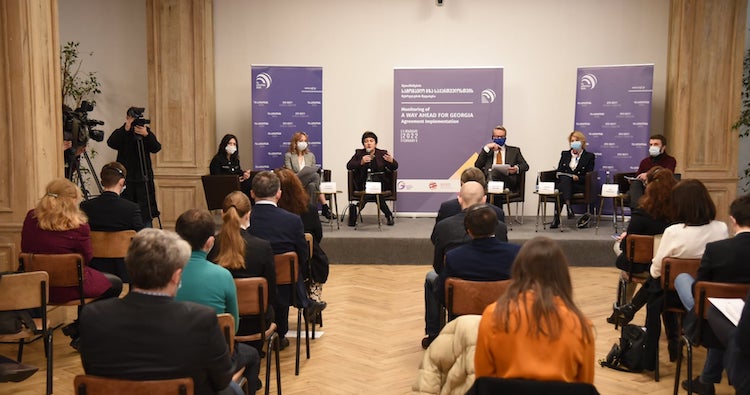NGOs: ambitious electoral reform partly carried out, judicial reforms almost failed

The report also reviews two more directions of political reforms: power distribution in the parliament and response to perceptions of a politicised judiciary. Photo: TI Georgia/Facebook.
Four Georgian-based non-governmental organisations that reviewed the implementation of the European Union-mediated April 19 agreement between the Georgian government and opposition, which put an end to six months of political tension over the country’s October 2020 parliamentary elections, say ambitious electoral reform was partly carried out in the country while pointing out that the fulfilment of judicial reforms almost failed.
Open Society Georgia Foundation, Georgian Democracy Initiative, International Society for Fair Elections and Democracy, and Transparency International Georgia presented their findings on Wednesday regarding the implementation of the terms of the agreement which committed its signatories to carry out large-scale electoral and judicial reforms.
Electoral reforms
The report of the NGOs observes the majority of the agreement’s stipulations regarding electoral changes have been partly implemented, such as a fully proportional election system, lowering of the threshold for local elections to 2.5 percent in Tbilisi and up to three percent in the rest of the country, as well as staffing of central, district and precinct election commissions.
It notes that, per a draft constitutional bill, the next two parliamentary elections will be conducted on a fully proportional system with a two percent threshold, adding the process of voting on the bill is underway in the parliament and therefore the reform has not been fully completed yet.
The NGOs also highlight that an initiative to cancel parties’ election registration in cases where agitation is carried out by foreign citizens has not been reflected in the legislation in accordance with the agreement. The report adds that another term of the agreement, on state funding of parties not being tied to their use of mandates, has not been considered.
A stipulation to elect the Head of the Central Election Commission based on a two-thirds of the parliament’s 150 MPs has been implemented, NGOs note.
Judiciary reforms
As for judicial amendments into the legislation, the NGOs note that most of the terms specified by the agreement have not been fulfilled, including suspension of the government-initiated process of appointing judges to the Supreme Court until the reforms are implemented.
The comments from the organisations say the first secret ballot of the list of candidates has been abolished and the procedure of public hearing after registration has been established along with “similar procedural improvements,” however noting these “clearly fail to meet the demand for a fundamental transformation of the judiciary amid a severe political crisis in the country, ongoing mediation with international partners and distrust of the judiciary.”
The report further notes that an issue of independence and impartiality of the High Council of Justice of Georgia remains challenging “despite four waves of reform.”
Particularly problematic is the fact that decisions are made according to pre-agreed and coordinated rules, which makes the existence of a collegial body meaningless,” the report reads.
The NGOs call on the ruling party to carry out the reforms first, before appointing the five non-judicial members of the High Council of Justice.
It also touches upon “an irreplaceable rule” for the appointment of the prosecutor general, if supported by a simple majority of MPs. The report says “the original version of the constitutional amendment, which called for election of the prosecutor general by a three-fifth majority by the next two convocations of the parliament, more or less met the requirement of political consensus.”
The report also reviews two more directions of political reforms: power distribution in the parliament and response to perceptions of a politicised judiciary.
It highlights that in terms of power distribution in the parliament, none of the stipulations of the agreement have come into effect, saying that the Jean Monnet Dialogue, a platform for facilitating mediation of dialogue and crisis management between Georgian political parties, has not yet been launched.
The report reads that despite preparatory works on initiating the platform, “no concrete steps have been taken, including a public discussion on the format of the dialogue, or meetings with political groups on this issue.”
As for the response to perceptions of a politicised judiciary, NGOs highlight that proposed changes partly meet with the terms of the agreement, naming the adoption of an amnesty bill for the June 2019 protests that were sparked by the presence of Russian MPs in the Georgian parliament, and the release of opposition-minded Mtavari Arkhi TV co-founder Giorgi Rurua and opposition leader Nika Melia, as examples.
The ruling Georgian Dream party annulled its signatory status to the April 19 agreement in July last year due to the largest opposition party United National Movement's refusal to join the agreement, "while other opposition parties were constantly violating it," the ruling party says.
However, the UNM signed the document in September, after over four months of refusing to apply its signature.
 Tweet
Tweet  Share
Share